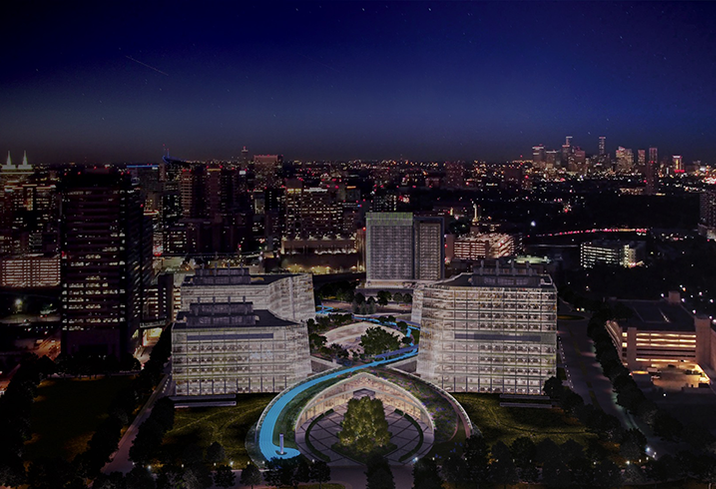
What happens in Houston’s healthcare sector matters everywhere. With the largest collection of hospital systems in the world, the Bayou City serves as a bellwether for the industry at large. As hospital systems and other healthcare providers rethink how they deliver care, many are changing their real estate strategies entirely. With Houston’s energy sector still struggling, healthcare will once again be the city’s largest job creator in the coming year. Flickr Texas Medical Center in Houston Where and how healthcare is being provided will continue to shift in 2020. The change starts at Houston’s healthcare epicenter, the Texas Medical Center, where the long-awaited TMC3 expansion project will break ground later this year. The 37-acre campus will add 1.5M SF of collaborative research space, integrating commercial operations with the Texas Medical Centers’ institutional knowledge. “We didn’t want to create an isolated district — we’re creating a hub,” said Elkus Manfredi CEO David Manfredi, whose firm is designing TMC3. “It’s the glue that makes the connections between all these.” With the Med Center leading the way, change will radiate outward toward Houston’s suburbs. The campus’ dense, Inner Loop location is great for collaboration, but its accessibility is a problem for residents in Houston’s sprawling population centers. Outpatient facilities have become common, with nearly every hospital system growing its outpatient care footprint. It comes down to billing. For the third year in a row, the top Houston-area hospitals reported average outpatient revenues grew, and now account for nearly half of total patient revenue, according to Colliers research. Courtesy of Texas Medical Center Texas Medical Center in Houston “I see a lot more outpatient construction coming,” Colliers Senior Vice President Beth Young said at the Houston Hospital, Outpatient Facilities & MOB Summit hosted by SquareFootage.Net. TMC institutions like MD Anderson, UTMB Health, Memorial Hermann, Houston Methodist and CHI St. Luke’s have all recently completed suburban expansions or are in the process of doing so. “The market is trending towards healthcare services,” CBRE Senior Vice President Brandy Bellow Spinks said. “Bellaire and the Museum District are pockets to keep your eye on.” Despite a robust healthcare sector, medical office building investment sales have lagged compared to recent years. There simply isn’t enough product to satisfy investors’ interest. High-profile institutional-grade medical office buildings and multi-building portfolios are few and far between. Young said private investors are snapping up properties under $20M, while REITs are hungry for assets over $20M. Cap rates vary significantly among asset classes. Young said off-campus medical office buildings can be as high as 6.8%, while premium properties are as low as mid-4%. Pixabay/DarkoStrojanovic Overall, both Young and Bellow Spinks think 2020 will be another good year for Houston’s healthcare sector. Once again, healthcare will create more jobs in Houston than any other industry, growing by an estimated 7,900 jobs in 2020, according to the Greater Houston Partnership. Even in the face of national economic headwinds, Houston’s healthcare industry is recession-proof, according to Young. If there is one thing that could hold the industry back, it is a robust pipeline. “There’s quite a bit under construction or proposed,” Bellow Spinks said. “If those buildings break ground, in some markets it could be interesting. That’s something to be aware of.”
